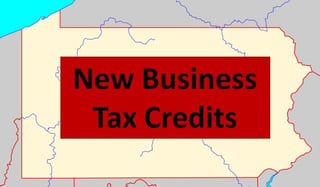 Pennsylvania is now offering additional and expanded tax credits to its businesses.
Pennsylvania is now offering additional and expanded tax credits to its businesses.
Included in Act 84 of 2016 – signed into law in July – are new and expanded tax credits especially intended to boost business. Noteworthy changes include the creation of a new Job Creation Tax Credit especially for veterans and the permanent extension of the R&D Tax Credit.
Check out these seven key tax credit changes:
R&D Tax Credit: The state Research and Development Tax Credit had expired as of Dec. 31, 2015, but Act 84 removed the sunset provision, extending it for the foreseeable future.
The R&D Tax Credit can be very lucrative since it’s a dollar for dollar reduction in tax. The end result doesn’t even have to produce a new product, but you can earn tax credits for qualified expenses, including wages for qualified services, supplies used in R&D activities and up to 65% of contract services simply for experimenting with new processes or product development. You may be surprised at what qualifies.
There’s also a federal R&D Tax Credit that also was recently made permanent, allowing for greater tax planning and savings.
 Tax Credit for New Jobs: Act 84 also offers a new Job Creation Tax Credit (now called the Tax Credit for New Jobs) for hiring qualified veterans. The $2,500 veterans’ credit also is more lucrative than standard $1,000 credit. Qualifying veterans include:
Tax Credit for New Jobs: Act 84 also offers a new Job Creation Tax Credit (now called the Tax Credit for New Jobs) for hiring qualified veterans. The $2,500 veterans’ credit also is more lucrative than standard $1,000 credit. Qualifying veterans include:
- Those who served on active duty in the U.S. Armed Forces, including a reservist or member of the National Guard.
- Those discharged or released from the service under honorable conditions.
- Those who completed an initial term of enlistment or qualifying period of service.
- Those disabled in the line of duty during training.
Pennsylvania also offers job creation grants generally worth $1,000 per every one job created. The Pennsylvania First Grants can be used for various purposes, including land and building improvements, new equipment and job training.
Educational Tax Credits: Educational tax credits permit significant business tax savings while also benefiting worthwhile education causes. Act 84 increased funding for programs including the Educational Improvement and Opportunity Scholarship Tax Credits from $100 million to $125 million annually.
The credits are available to businesses and pass-through entities that contribute to certain to scholarship organizations and educational improvement organizations approved by the Pennsylvania Department of Community and Economic Development.
Businesses can use the credit against several state taxes, including Corporate Net Income Tax, Personal Income Tax, Capital Stock/Foreign Franchise Tax and Malt Beverage Tax. A $100,000 donation generates a $75,000 tax credit while a two-year consecutive contribution receives a 90% percent tax credit or, $90,000 for each of the two years.
Manufacturing and Investment Tax Credit: This is a new tax credit especially for manufacturers, though it appears only large, fast-growing companies could qualify.
The new benefit allows for a credit equal to 5% of new taxable payroll to manufacturing companies that increase their annual taxable payroll by at least $1 million over a four-quarter period. Act 84 allows a $4 million annual allocation for the credit beginning in the 2017-18 fiscal year.
To qualify, businesses must demonstrate the following:
- Ability to create an increase in annual taxable payroll by at least $1 million through the creation of new jobs.
- Ability to maintain the increase for a period of at least 5 years from the start date.
- Intent to maintain existing operations in PA for a period of at least 5 years from the start date.
- New jobs must be full-time, have an average wage equal to or above the county average wage in which the company is locating or expanding, and include competitive health benefits.
Malt Beverage Tax Credit: Pennsylvania’s tax credit especially for brewers – which was previously offered between 1974 and 2008 – was reinstated for the 2017-18 fiscal year.
The credit provides an annual $200,000 maximum tax credit for qualifying capital expenditures, including most equipment or machinery used in brewing. Check out this article for more details.
Mixed Use Development Tax Credit: This new tax credit is designed to help communities address affordable housing shortages and support business growth. The program allows developers to access funds for construction or rehabilitation projects that enable affordable housing and business in the same structure.
Tax credit availability is based on the sale of the credits from the Pennsylvania Housing Finance Agency. Act 84 allows a $2 million annual allocation for the credit beginning in the 2017-18 fiscal year.
Waterfront Development Tax Credit: This new tax credit is designed to generate funding for waterfront development projects that provide or improve public access to waterfront sites within the commonwealth. Contributions in the form of cash or personal property may be donated to an approved waterfront organization for up to a 75 percent equivalent tax credit per contributed dollar. Act 84 allows $1.5 million annual allocation for the credit beginning in the 2017-18 fiscal year.
Locally, Act 84 also included some changes to the Neighborhood and City Revitalization Improvement Zones, also known as the NIZ and the CRIZ. Contact our office for more details on those changes or to find out how your business might qualify for the aforementioned seven tax credits.




